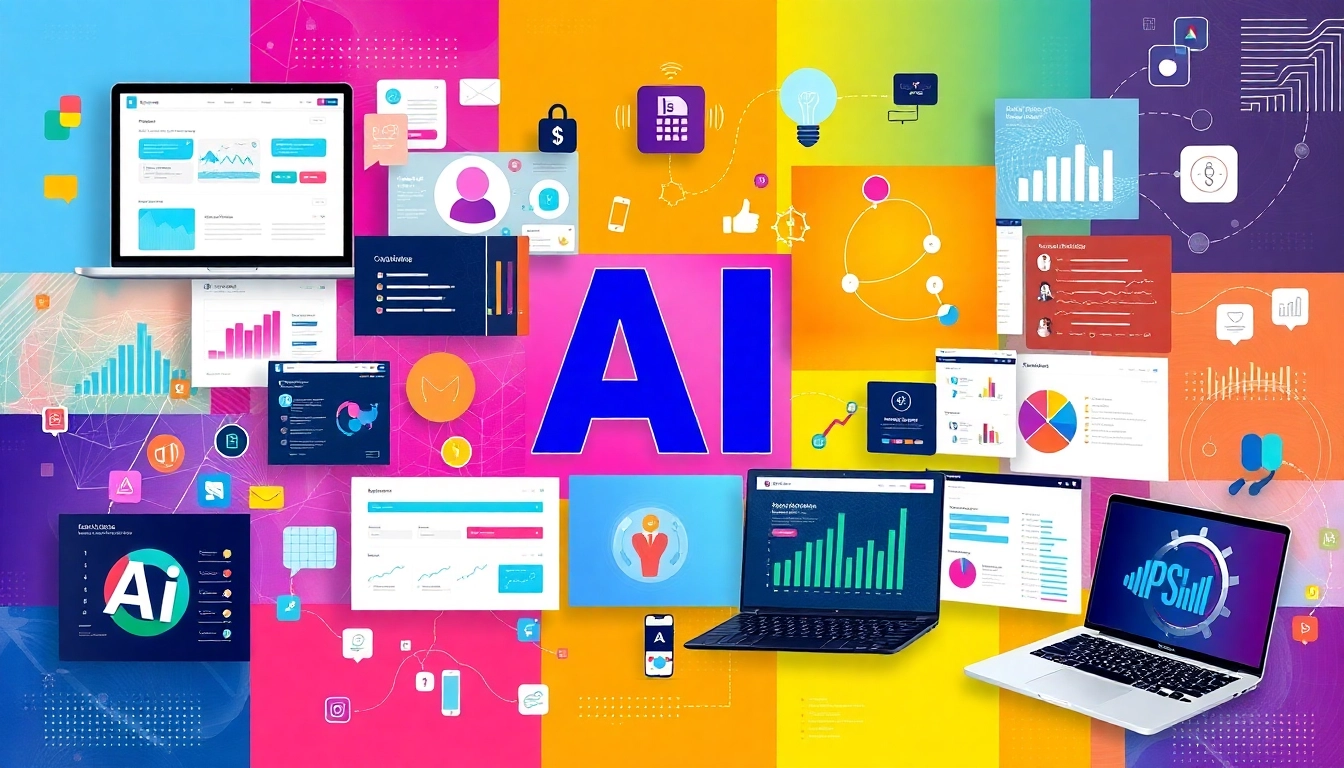Introduction to AI Marketing Tools
The world of marketing is evolving rapidly, driven by advances in technology and shifts in consumer behavior. Today, businesses are leveraging AI marketing tools to enhance their strategies, optimize workflows, and personalize consumer interactions. These tools are not just a trend; they represent a fundamental shift in how marketing professionals approach their work. In this article, we will explore what AI marketing tools are, their benefits, the current trends shaping the landscape, and how businesses can effectively implement them.
What are AI Marketing Tools?
AI marketing tools encompass a wide range of software applications and platforms that use artificial intelligence to support various aspects of marketing. These tools can perform tasks ranging from data analysis and content creation to social media management and customer engagement. By harnessing machine learning algorithms and natural language processing, AI marketing tools enable marketers to automate repetitive tasks, gain insights from big data, and deliver personalized experiences to their customers.
Benefits of Using AI Tools in Marketing
The adoption of AI marketing tools comes with numerous advantages, including:
- Increased Efficiency: AI tools automate mundane tasks, allowing marketing teams to focus on strategic activities.
- Enhanced Data Analysis: With AI, marketers can analyze vast amounts of data quickly, uncovering insights that inform decision-making.
- Personalization: AI enables marketers to tailor content and communications based on individual customer preferences and behaviors.
- Improved Customer Engagement: AI tools enhance interactions through chatbots, personalized messaging, and targeted advertising.
- Cost Savings: By streamlining operations and optimizing campaigns, AI tools can lead to significant cost reductions over time.
Current Trends in AI Marketing
As we look towards 2025, several trends are emerging in the realm of AI marketing:
- Predictive Analytics: Marketers are increasingly utilizing AI tools that can predict future customer behavior based on past interactions.
- Content Generation: AI is not just about data; it’s also about creating compelling content efficiently, from blog posts to social media updates.
- Voice Search Optimization: With the rise of voice-activated search assistants, marketers are adapting their strategies to include voice search optimization.
- Hyper-Personalization: Marketing strategies are becoming more focused on delivering hyper-personalized experiences, utilizing AI to analyze real-time data.
- Integration of AI with CRM: Many businesses are integrating AI with customer relationship management (CRM) tools to enhance customer insights and interactions.
The Best AI Marketing Tools in 2025
Overview of Top Tools
As we move into 2025, here are some of the most impactful AI marketing tools that businesses may consider:
- Jasper: An AI content generation tool that helps marketers create high-quality content tailored to their audience.
- HubSpot: Offers a suite of AI-powered tools for inbound marketing, helping businesses manage leads, and optimize campaigns.
- MarketMuse: An AI-driven content research platform that helps marketers create content strategies based on gaps in existing content.
- Clearscope: Focuses on enhancing SEO performance by providing insights on content optimization.
- Drift: A conversational marketing platform that uses AI to engage visitors in real-time and streamline the conversion process.
Comparative Analysis of Features
When assessing AI marketing tools, it’s crucial to compare their features. Here’s a brief comparison of some top tools:
| Tool | Primary Functionality | Key Features |
|---|---|---|
| Jasper | Content Generation | AI writing assistant, templates for various content types, and SEO tools |
| HubSpot | Inbound Marketing & CRM | Email automation, social media tools, and lead tracking |
| MarketMuse | Content Optimization | Content specificity scoring, strategy insights, and competitive analysis |
| Drift | Conversational Marketing | AI chatbots, lead capture forms, and analytics |
User Reviews and Recommendations
Feedback from users can provide valuable insights into the effectiveness of AI marketing tools. According to recent reviews:
- Jasper: Many users praise its ability to produce high-quality content quickly and its user-friendly interface.
- HubSpot: Users appreciate its comprehensive tools that seamlessly integrate with their workflows.
- MarketMuse: Reviews highlight its powerful content analysis capabilities that can significantly improve SEO performance.
- Drift: Users report increased conversion rates due to its engaging real-time communication features.
How to Implement AI Marketing Tools Effectively
Steps to Integrate Tools into Your Strategy
Integrating AI marketing tools into your marketing strategy requires careful planning and execution. Here are the essential steps:
- Identify Specific Needs: Assess your marketing objectives and pinpoint where AI tools can provide the most value.
- Research and Select Tools: Evaluate various tools available in the market, considering their features, pricing, and user reviews.
- Develop a Strategy: Create a detailed strategy that defines how you will leverage AI tools in your marketing efforts.
- Train Your Team: Ensure that your marketing team is adequately trained in using the selected tools to maximize their potential.
- Track and Measure Outcomes: Continuously measure the effectiveness of the tools using key performance indicators (KPIs) to assess their impact.
Training Your Team
Training is crucial for successful implementation. Conduct workshops, provide access to online courses, and encourage team members to explore the functionalities of the tools. Establish a culture of continuous learning where marketers can stay updated on the latest AI advancements and best practices.
Measuring Success and ROI
To ensure that AI marketing tools are meeting your goals, it’s essential to define how success will be measured. Common KPIs to consider include:
- Conversion Rates
- Customer Acquisition Cost (CAC)
- Return on Investment (ROI)
- Customer Lifetime Value (CLV)
- Engagement Metrics (like click-through rates, open rates, etc.)
Common Challenges and How to Overcome Them
Identifying Key Pain Points
While AI marketing tools offer significant advantages, businesses may encounter challenges during implementation. Common pain points include:
- Resistance to Change: Employees may resist adopting new technologies.
- Data Privacy Concerns: The use of AI can raise issues around data security and privacy.
- Integration Difficulties: Integrating new tools with existing systems can be complex.
Solutions for Integration Difficulties
To combat integration challenges, follow these strategies:
- Choose Tools That Integrate Easily: Select tools that are designed to work with your current systems.
- Engage IT Specialists: Collaborate with IT to address technical issues during the integration process.
- Provide Clear Communication: Ensure that all team members understand the benefits and purposes of the new tools.
Monitoring and Adapting Strategies
Continuous monitoring and adaptation are essential for success. Regularly review your strategy, analyze how well the tools are meeting your KPIs, and be willing to pivot if necessary. Staying agile in your marketing approach allows you to respond effectively to market changes and technological advancements.
Future of AI in Marketing
Emerging Technologies to Watch
As technology continues to evolve, so too will the capabilities of AI marketing tools. Key emerging technologies include:
- Advanced Natural Language Processing: Future AI tools will possess an even deeper understanding of human language, improving content personalization.
- Blockchain for Data Security: Incorporating blockchain may enhance data security and privacy, making customers more comfortable with AI-driven solutions.
- Hyperautomation: The integration of multiple AI systems to automate processes across various marketing functions will become more prevalent.
Predictions for 2026 and Beyond
By 2026, we anticipate that AI will be embedded in almost every aspect of marketing. Predictive analytics will become more precise, enabling businesses to tailor their marketing strategies with unparalleled accuracy. Moreover, as ethical AI practices become paramount, businesses will need to prioritize transparency and responsibility in their usage of AI tools.
Preparing for an AI-Driven Marketing Landscape
To prepare for an AI-driven future, businesses should:
- Invest in Training: Equip teams with the necessary skills to adapt to evolving AI technologies.
- Stay Informed: Keep abreast of the latest trends, tools, and best practices in AI marketing.
- Leverage Data Responsibly: Ensure that data usage complies with regulations while enhancing customer trust.
In conclusion, AI marketing tools offer immense potential to transform how businesses engage with customers and optimize their marketing efforts. By understanding their functionalities and implementing them thoughtfully, companies can stay ahead in this dynamic landscape and significantly boost their marketing return on investment.



